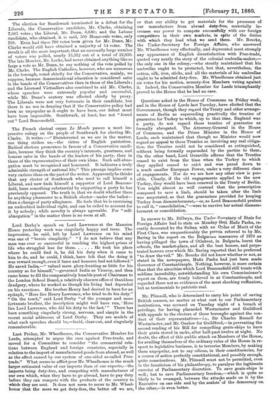Lord Derby's speech on Lord Lawrence at the Mansion House
yesterday week was singularly happy and terse. The impression, he said, left by Lord Lawrence on his mind was one of "heroic simplicity." "I do not believe that any man was ever so successful in reaching the highest prizes of
life who struggled less for them He took his place where he could find it, he did his duty when it came to him to do, and he could, I think, have felt that the doing it was reward enough, even if fame and honours had not followed." He saved India,—" valued mere glory-hunting as little for his country as for himself,"—governed India as Viceroy, and then came home to fill the comparatively humble post of Chairman to the London School Board, a relatively obscure office of thankless drudgery, where he worked as though his living had depended on his exertions. His brother Henry had desired to have for an epitaph, "Here lies Henry Lawrence, who tried to do his duty." "On the tomb," said Lord Derby "of the younger and more fortunate brother, the inscription might well have run, Here lies Lord Lawrence, who did his duty to the last." There has been something singularly strong, nervous, and simple in the recent social addresses of Lord Derby. They are models of what such speeches should be,—lucid, clear-cut, and singularly rememberable.


































 Previous page
Previous page